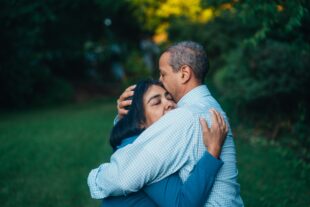Forgiveness: Why We Should Forgive and How It Transforms Our Lives (Part 2)
Karyn George
This is the second of a two-part series about the importance of forgiveness in our lives. If you haven’t read Part 1 already, I encourage you to read it here: Forgiveness Article Part 1. In the first article, I covered the common misconceptions of what forgiveness is and isn’t, why we should do it, the common barriers to forgiveness, and how forgiveness works can be an important aspect of the therapeutic process.
 Another wonderful resource that my first article was inspired by is Lysa TerKeurst’s book, Forgiving What You Can’t Forget (she also has a wonderful study guide and forgiveness journal you can purchase). Lysa TerKeurst’s forgiveness materials are the resources I most often refer my clients to when they are engaging in forgiveness work.
Another wonderful resource that my first article was inspired by is Lysa TerKeurst’s book, Forgiving What You Can’t Forget (she also has a wonderful study guide and forgiveness journal you can purchase). Lysa TerKeurst’s forgiveness materials are the resources I most often refer my clients to when they are engaging in forgiveness work.
In part two of this series, I will be focusing on forgiveness as a regular part of our everyday lives, why it is vital for both our hearts and our relationships, as well as how and why we can forgive daily because of Jesus’ grace.
Micro-forgiveness: Forgiveness as an Everyday Practice
I think forgiveness can be thought of on a spectrum of extremes. On one end of the extreme, is something that perhaps occurs a few times in our lives regarding some pivotal, painful event. Or conversely, as a trite, “I’m sorry” script parents require of little kids when they take a toy from their playmate.
Although both of these are true, I want us to consider how forgiveness can be a regular part of our spiritual lives, especially with those with whom we live life the most, and therefore naturally have ample opportunities to do things that require forgiveness.
In part one of this series, I referred to our hearts as a garden and, as you may know from even the most basic experiences with horticulture, gardens take tending to thrive. Our hearts (and relationships for that matter) are like that too and the importance of caring for our hearts is referred to constantly in the Bible. Here are a few examples:
Guard your heart above all else, for it determines the course of your life. – Proverbs 4:23
A good tree can’t produce bad fruit, and a bad tree can’t produce good fruit. A tree is identified by its fruit. Figs are never gathered from thorn bushes, and grapes are not picked from bramble bushes. A good person produces good things from the treasury of a good heart, and an evil person produces evil things from the treasury of an evil heart. What you say flows from what is in your heart. – Luke 6:43-45
As a face is reflected in water, so the heart reflects the real person. – Proverbs 27:19
Keeping in line with this garden/heart analogy, when we are gardening, it is pivotal to excavate the invasive weeds before they take over the rest of the garden and end up choking out the good, healthy fruit. (In part one, I referred to these invasive weeds as “bitterness” and “resentment”- classic signs of unforgiveness).
 However, it is equally important to clear out the little weeds along the way, which also ends up preventing the invasive roots from ever forming in the first place. This regular weeding of the gardens which are our hearts is what I like to refer to as “micro-forgiveness.”
However, it is equally important to clear out the little weeds along the way, which also ends up preventing the invasive roots from ever forming in the first place. This regular weeding of the gardens which are our hearts is what I like to refer to as “micro-forgiveness.”
This doesn’t mean that the offenses are less hurtful or costly. Remember, Jesus had to die so that any and every one of our sins or sins done against us could be forgiven. Micro-forgiveness is making forgiveness a regular part of our lives and a regular part of caring for our hearts and therefore our relationships.
Why should I make forgiveness a regular part of my spiritual life?
The daily small slights, hurts, or upsets in our closest relationships are the little weeds we need to uproot before they grow into the bigger, more problematic, invasive weeds of bitterness and resentment. This takes a level of self-reflection. I’ve noticed that people tend to swing toward one tendency or the other.
We can constantly dismiss these hurts or pains and act like they don’t affect us to avoid possible conflict, confrontation, or connecting to painful emotions. Or we can swing to the other extreme and become overly critical, pointing out every little slight or offense we feel to our partner, friends, or family.
A lot of this is work that, first and foremost, needs to be done in our hearts before the Lord. This by no means negates the need for loving relational conversations, but our hearts need to be cared for along the way and even before we consider having a potential conversation. We need to remove the log from our eye by bringing our hearts before the Lord to forgive and ask for forgiveness before we should approach our loved ones to remove the speck from their eye.
Our hearts will always be our biggest problem. This takes a constant life of reflection, listening to the Holy Spirit, and accepting the power of what Christ did on the cross that covers our sins, as well as the sins committed against us. Author, speaker, pastor, and counselor, Paul Tripp, uses The Proverbs to describe the concept and importance of caring for our hearts:
“The Proverbs helps you to realize that what’s hot and happening in you is your heart; that what controls your heart has you. Your life always lives under the control of the heart. That means lasting change, in any person’s life, always starts with your heart. Proverbs would say the heart is a problem, and Proverbs would remind me that my greatest problem in all of my life doesn’t exist outside of me; it’s not those less-than-perfect people and all those less-than-perfect places in my life. My greatest problem is inside of me. It’s the thoughts and motives and idols of my own heart. It’s the tendency for me to put myself in the center when God must be the center.”
 When we practice regular forgiveness, we are remembering the importance the Bible places on caring for the garden of our hearts, making room and opportunity for the fruit of the Spirit to grow and thrive (love, joy, peace, patience, kindness, goodness, faithfulness, gentleness, and self-control).
When we practice regular forgiveness, we are remembering the importance the Bible places on caring for the garden of our hearts, making room and opportunity for the fruit of the Spirit to grow and thrive (love, joy, peace, patience, kindness, goodness, faithfulness, gentleness, and self-control).
This comes as we regularly repent of and remove, by God’s grace and Christ’s work on the cross, the acts of the flesh (idolatry and witchcraft; hatred, discord, jealousy, fits of rage, selfish ambition, envy, etc.) – all of which take root and thrive in a heart which contains the soil of unforgiveness.
How can I make forgiveness a regular part of my life?
So how can it be that we can humbly and regularly “die to ourselves” to constantly forgive and be forgiven? Doesn’t this lead to naval gazing and darkness? Quite the contrary! Needing forgiveness, and needing to extend it to others, can give us a greater awareness of both the joy and the relief of the undeserved nature of grace (inspired by a Dwell app devotional, 2025).
It also gives us a greater encounter with the mercy of God and, as Lamentations reminds us, “His mercies are new every morning.” We take the opportunity to notice, receive, and accept the mercy God bestows upon us today and every day! The Lord has recently put on my heart that I can forgive those who are in my life daily because I need forgiveness from the Lord daily!
It is because He has lavished his grace upon me every day (because that’s how often I need it!) that I can, in response, pour what I have been given into others. When I withhold this grace for others, I am putting myself above God, saying that what He did on the cross was enough for my sins to be forgiven, but not enough for the sins of those who hurt me to be forgiven.
This concept is displayed in the parable of the unforgiving servant in Matthew 18:23-34. Jesus shares this parable in response to his conversation with Peter, “…Lord, how often should I forgive someone who sins against me? Seven times?” “No, not seven times, “Jesus replied, “but seventy times seven!” (Matt 18:21b-22).
In this parable, a King forgives a large debt of one of his servants after the servant falls on his knees and begs him for grace. The servant then went home and grabbed a man by the throat and demanded that he repay a much smaller debt. Even after the man begged him for grace and for more time to resolve his debt, the servant had him thrown in jail until the debt would be paid in full.
 When we hold small resentments in our hearts against those in relationship with us, we are being like that unforgiving servant whose huge debt has been paid by Jesus’s work on the cross, but we are unwilling to actively care for our hearts and surrender to God the offenses we experience from others. When we do that, we agree that His work on the cross covers not just our sins but their sins too!
When we hold small resentments in our hearts against those in relationship with us, we are being like that unforgiving servant whose huge debt has been paid by Jesus’s work on the cross, but we are unwilling to actively care for our hearts and surrender to God the offenses we experience from others. When we do that, we agree that His work on the cross covers not just our sins but their sins too!
This uncomfortable dying to ourselves and our egos ends up freeing us from the heavy weight of unforgiveness that Jesus died to release us from and, in turn, models Jesus’ sacrificial grace to those in our lives. What a beautiful reflection of God’s grace we can bring into our relationships! When we extend grace to others, we are pointing them toward the love of Jesus and the truths of the Gospel instead of holding them captive to our own hurts, pride, and resentments.
How can I practically apply this in my life?
I recommend making this a regular part of your prayer time with the Lord. When I am reflecting on my day, not only am I asking the Lord to search my heart for things that I need to repent of, but also things I need to release into His good and merciful hands too. Like I said earlier, this takes a level of self-reflection, and also listening to the Holy Spirit.
This can be a beautiful part of your counseling experience that your counselor can help you develop. If you don’t have a counselor of your own yet, contact us today at Spokane Valley Christian Counseling to find a good match for your specific counseling needs.
“Forgiveness”, Courtesy of BenteBoe, Pixabay.com, CC0 License; “Gardening”, Courtesy of Pixabay, Pixabay.com, CC0 License; “Heart Vandalism”, Courtesy of analogicus, Pixabay.com, CC0 License; “Forgiveness”, Courtesy of Gus Moretta, Unsplash.com, CC0 License






